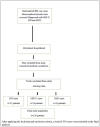Comparison of Eosinophil Counts in Inflammatory Conditions: Multisystem Inflammatory Syndrome in Children, Kawasaki Disease, and Infectious Mononucleosis
- PMID: 38397316
- PMCID: PMC10887273
- DOI: 10.3390/children11020204
Comparison of Eosinophil Counts in Inflammatory Conditions: Multisystem Inflammatory Syndrome in Children, Kawasaki Disease, and Infectious Mononucleosis
Abstract
This study examined the distinctions between multisystem inflammatory syndrome associated with coronavirus disease 2019, Kawasaki disease, and infectious mononucleosis. These three inflammatory disorders have commonalities according to clinical and laboratory results, particularly in relation to eosinophil levels. In this retrospective, single-center study, we documented the examination records (acute phase reactants and complete blood count) and clinical and cardiological findings of 130 patients diagnosed with multisystem inflammatory syndrome, Kawasaki disease, and infectious mononucleosis. These patients were treated and received follow-up care in our hospital from March 12, 2020, to September 13, 2022, as per the hospital records. Statistical analyses were performed using NCSS 2007, version 1 software. Eosinopenia was more prevalent in children with multisystem inflammatory syndrome than in those with Kawasaki disease, who showed normal or elevated eosinophil counts. The eosinophil counts in patients with infectious mononucleosis typically fell within the normal range. Our study found no correlation between the eosinophil counts and cardiac involvement in pediatric patients with either condition. These findings indicate a higher prevalence of eosinopenia in patients with multisystem inflammatory syndrome, irrespective of cardiac involvement, than in those with Kawasaki disease. Despite similarities in clinical findings, Kawasaki disease and multisystem inflammatory syndrome in children necessitate further studies for distinct characteristic elucidation.
Keywords: Kawasaki disease; MIS-C associated with COVID-19; cardiac involvement; eosinopenia; infectious mononucleosis; inflammatory disease.
Conflict of interest statement
The authors declare no conflicts of interest.
Figures
Similar articles
-
Clinical Subphenotypes of Multisystem Inflammatory Syndrome in Children: An EHR-based cohort study from the RECOVER program.medRxiv [Preprint]. 2022 Sep 27:2022.09.26.22280364. doi: 10.1101/2022.09.26.22280364. medRxiv. 2022. Update in: Sci Rep. 2023 Nov 28;13(1):21005. doi: 10.1038/s41598-023-47655-y. PMID: 36203555 Free PMC article. Updated. Preprint.
-
A machine-learning algorithm for diagnosis of multisystem inflammatory syndrome in children and Kawasaki disease in the USA: a retrospective model development and validation study.Lancet Digit Health. 2022 Oct;4(10):e717-e726. doi: 10.1016/S2589-7500(22)00149-2. Lancet Digit Health. 2022. PMID: 36150781 Free PMC article.
-
[Kawasaki disease and multisystem inflammatory syndrome in children. Differences, and similarities in a pediatric center in Mexico].Rev Alerg Mex. 2023 Jun 28;70(2):80-88. doi: 10.29262/ram.v70i3.1237. Rev Alerg Mex. 2023. PMID: 37566771 Spanish.
-
Similarities and Differences Between COVID-19-Related Multisystem Inflammatory Syndrome in Children and Kawasaki Disease.Front Pediatr. 2021 Jun 18;9:640118. doi: 10.3389/fped.2021.640118. eCollection 2021. Front Pediatr. 2021. PMID: 34222140 Free PMC article. Review.
-
Current Understanding of Multisystem Inflammatory Syndrome (MIS-C) Following COVID-19 and Its Distinction from Kawasaki Disease.Curr Rheumatol Rep. 2021 Jul 3;23(8):58. doi: 10.1007/s11926-021-01028-4. Curr Rheumatol Rep. 2021. PMID: 34216296 Free PMC article. Review.
Cited by
-
A Comparison of Kawasaki Disease during the SARS-CoV-2 Pandemic with Multisystem Inflammatory Syndrome in Children.Children (Basel). 2024 Sep 28;11(10):1185. doi: 10.3390/children11101185. Children (Basel). 2024. PMID: 39457150 Free PMC article.
References
-
- Owens A.M., Plewa M.C. StatPearls. StatPearls Publishing; Treasure Island, FL, USA: 2023. [(accessed on 26 June 2023)]. Kawasaki disease. Available online: https://www.ncbi.nlm.nih.gov/books/NBK537163/
-
- McCrindle B.W., Rowley A.H., Newburger J.W., Burns J.C., Bolger A.F., Gewitz M., Baker A.L., Jackson M.A., Takahashi M., Shah P.B., et al. Diagnosis, treatment, and long-term management of Kawasaki disease: A scientific statement for health professionals from the American Heart Association. Circulation. 2017;135:e927–e999. doi: 10.1161/CIR.0000000000000484. - DOI - PubMed
LinkOut - more resources
Full Text Sources


